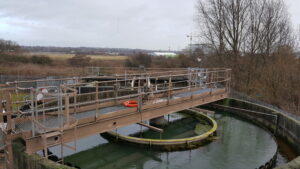Steve Palfrey, chair of ADEPT’s Waste Group, talks about the twin issues of Covid-19 and Brexit facing local authority waste services.
It is now over a year since Covid-19 was identified and the global pandemic began. Since then, we’ve seen a huge impact on UK local authority waste services in various ways, where the sector has had to rapidly adapt to fit changing circumstances.
In March 2020, ADEPT launched a national waste service survey, to provide a regular snapshot of the impact on household waste and recycling, bulky waste collections and household waste recycling centres, as well as commercial services across the country.
The survey – completed by local authorities across the country and run with partners including Defra, Local Authority Recycling Advisory Committee (LARAC), the Local Government Association (LGA) and the National Association of Waste Disposal Officers (NAWDO) – ran for six months.
During the first national lockdown, and during the initial wave of infections, local authorities felt an impact in terms of staffing numbers through sickness and requirements to self-isolate. Collection services had to be scaled back and prioritised. In most areas of the country, garden and bulky waste collections were suspended and in around a quarter of authority areas, even the core refuse and recycling collections were disrupted. 95% of household waste and recycling centres were closed across the country.
Since then, local authorities and wider society have found ways to adapt. The introduction of testing has helped to reduce the impact of self-isolation on staff numbers and return large numbers to the workforce.
One of the more positive impacts of the virus has been to encourage innovation across the sector, with many more services moving to cashless payment and the introduction of booking systems for household waste recycling centres by some authorities to help manage demand and ensure social distancing can be maintained. It has been a steep learning curve for councils and their contractors to rethink services in a manner that reduces infection risk.
Local authorities have introduced new operating procedures to encourage social distancing and protect staff and visitors. By mid-May, most household waste and recycling centres across the country had reopened.
More recently, cases of the virus have increased rapidly again with the new, more infectious strains being identified. And once again, local authorities are feeling the impacts on staff availability.
Another current issue is around the waste generated by mass testing in schools, workplaces, and the community. Some of the waste is classed as ‘offensive waste’ and is expected to be handled through specialist collections and clinical waste disposal. But with the unprecedented scale of testing being rolled out, there are concerns that there may not be sufficient capacity within the sector.
The Environment Agency is providing some flexibility through a temporary regulatory position on municipal incinerators, but the collection capacity is a real challenge. We are working with government and other stakeholders to identify how the volume of material expected from mass testing can best be managed.
Another live issue is whether to encourage or require visitors to household recycling centres to wear face coverings. The government guidance on face coverings has evolved as more has been learned about the virus. This discussion demonstrates the continuously changing message that local authorities need to disseminate.
Brexit has resulted in a challenge for the movement of resources and recyclable materials from the UK into and across Europe. Most hauliers are reporting significant delays in the movement of materials across borders and some are focusing on non-EU markets until the until this disruption is resolved. This is predicted to result in lower material prices which will ultimately affect council finances.
ADEPT restarted the national waste service survey again in February 2021, to assess the impact of the current lockdown. With the revised operating procedures, it is hoped that the service impacts in 2021 will be less significant than in the first wave. Mass closure of household waste recycling centres is certainly not expected.
The challenges facing the sector over the past year have been significant, but councils and their contractors have shown innovation and imagination in finding solutions. To support the sector further, in the short term we need government to work closely with the EU to re-establish the smooth flow of goods across borders. In the longer term we would like to see government encouraging greater investment in UK reprocessing infrastructure to reduce reliance on exports and support a shift to a circular economy. With more details on the Resources and Waste Strategy anticipated soon, local authority waste services will need to continue adapting and innovating as new challenges emerge.
· More information about ADEPT can be found on its website: www.adeptnet.org.uk
· More information about ADEPT’s work on climate change can be found here: https://www.adeptnet.org.uk/projects/climate-change-hub
· More information about the waste survey can be found here: https://www.adeptnet.org.uk/covid-19-waste-survey-results
















